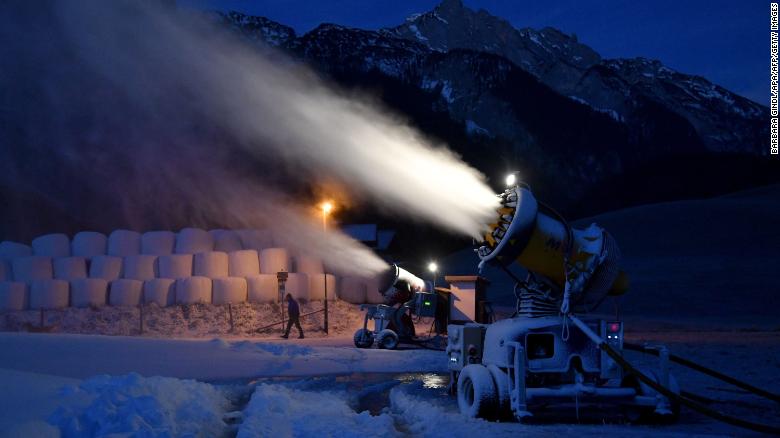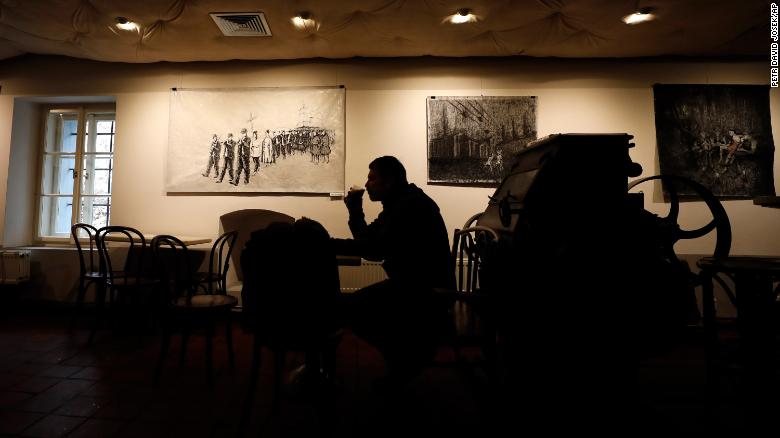Family festivities or safe, solo celebrations. Here’s how Europe is handling a Covid-19 Christmas

(CNN)Europe is preparing for a Christmas season like no other, as governments desperately try to thread the needle between preserving public health and allowing families to gather for traditional celebrations at the end of a tough year.
Countries across the continent are taking varied approaches, even as Covid-19 cases continue to rise in some nations.
Here’s what European nations are planning this festive season.
Austria
Austria is opening ski resorts with limited capacity from Christmas Eve, for locals only. The country’s chancellor Sebastian Kurz said on December 2 that skiing could resume from December 24, for the festive period — but only for people living close to the slopes.
Kurz said skiing, at least for the day, would be possible “for a large part of our population.” But he added that lift capacity would be limited and hotels and accommodation providers would remain shut until January 7.
https://unworldoceansday.org/index.php/user/7830
Restaurants, cafes, bars and clubs will also remain closed until January 7, according to Kurz, allowing for the possibility that if infection rates drop, the government may loosen restrictions.
But the limited relaxation of rules for locals has been accompanied by new quarantine requirements for travelers, which were unveiled by the government at the beginning of December.

Snow cannons blow snow on the hills in the Abtenau ski resort on December 1.
”Tourist travel is currently de facto not possible in Austria, in light of the measures against the coronavirus,” the government statement said.
The new rules mean that until January 10, all arrivals in Austria from a country with more than 100 Covid-19 cases per 100,000 people in the previous two weeks will have to quarantine for 10 days.
https://unworldoceansday.org/index.php/user/7836
This period can be shortened if visitors test negative after five days in isolation.
(As of December 3)
Belgium
Belgium has allowed nonessential shops to reopen from December 1. Museums and swimming pools are also allowed to open, in accordance with their industry protocols.
But the country will continue to require people to comply with social distancing protocols over the festive break.
“During the Christmas period, social contact rules will continue to apply,” Belgium’s Consultative Committee said in a statement on November 30.
People living alone will be allowed to be with two other people, maximum, “on Christmas Eve or Christmas Day, to protect their psychosocial well-being,” the committee said. “For meetings outside, the rule of four continues to apply.”
https://unworldoceansday.org/index.php/user/7845
A general ban on large gatherings remains in place, as does a curfew between midnight and 5 a.m.
Travelers will also be required to quarantine.
“Persons who have spent more than 48 hours abroad and who will remain in Belgium for more than 48 hours will be subject to stricter controls,” the committee said on November 30.
These measures will apply until 15 January 2021.
“At the beginning of January, the situation will be reassessed, based on the medical indicators, to see whether and for which industries a transition to the management phase … is possible,” the committee said.
(As of November 30)
Bulgaria
The Bulgarian government has extended the closure of nightclubs, casinos, restaurants and sports halls nationwide until at least the end of January.
A ban remains in place on events, conferences and visiting most retail shopping malls, except for businesses providing services such as banks, pharmacies, grocery stores and telecommunications companies.
From January 1, theaters, museums, galleries and cinemas can reopen, at 30% capacity.
Kindergartens, nurseries and classrooms for students from first to fourth grade will open after the holidays on January 4.
Dining areas in hotels will operate a shift system for breakfast, lunch and dinner, at no more than 50% of seating capacity and with a closing time of no later than 10 p.m.
https://unworldoceansday.org/index.php/user/7850
On December 17, the country’s Ministry of Health reported 1,959 new Covid-19 cases.
(As of December 17)
Croatia
Croatia is still considering the measures for its Christmas period, but Health Minister Vili Beros said on December 12 that “he did not believe a strict lockdown would be imposed.”
Beros noted that though a possible travel ban between countries was being discussed, it was unlikely to be introduced, according to Croatia’s Public News Agency HIRA.
Meanwhile, Interior Minister Davor Bozinovic, who is the head of the national Covid-19 response team, has called on Croatians to avoid visiting friends and relatives over the holiday period.
All secondary schools in Croatia have switched to online classes.
After a spike in cases, Croatia announced new restrictions, which include “locking down cafes and restaurants, and a ban on wedding parties, fairs and most sports events.”
https://unworldoceansday.org/index.php/user/7851
These restrictions will be in place from November 28 to December 21.
(As of December 12)
Cyprus
In Cyprus, the hospitality sector — bars, restaurants and cafes — will be shut until the end of the year. The stricter measures were announced by Cypriot Health Minister Constantinos Ioannou during the first week of December.
High school students have also switched from in-person classes to online ones.
Cyprus is also banning church attendance over Christmas. A 9 p.m. curfew and a ban on gatherings of more than 10 people in houses remain in place.
Retail and department stores can, however, remain open — under strict rules.
(As of December 14)
Czech Republic
The lower house of the Czech parliament has extended the country’s state of emergency to December 23 — one day before Christmas Eve, which is traditionally the main day of celebrations in the Czech Republic.
The Czech Republic has seen a surge in cases in recent months.
Its state of emergency was originally scheduled to end on December 12.
The government had sought an extension until January 11, arguing it was a necessary step to control the spread of the coronavirus.
(As of December 9)

A man enjoys a beer at a bar in Prague on December 3.
Denmark
Denmark will enter a national lockdown over the Christmas period, after the country recorded its highest number of new coronavirus infections since the pandemic hit.
https://unworldoceansday.org/index.php/user/7853
From December 25, all stores, except those that sell food and medicine, will be closed. Hospitality venues will be closed except for takeout. Shopping centers will be closed across the country from December 17 and businesses such as hair salons will close on December 21. The lockdown will last until January 3.
Hospitals will postpone all non-critical treatments for three weeks starting December 21, to prepare for a potential increase in cases.
Officials have recommended that people keep to a maximum of 10 people in private homes and a maximum of 10 social contacts during the Christmas period and on New Year’s Eve.
People in Denmark are allowed to see their closest family members on Christmas Eve, and these family members will not be included in the 10 social contacts.
Communal eating at social care institutions will be allowed for up to 50 people, in groups of no more than 10, on Christmas Eve and New Year’s Eve. Religious communities will be able to host services conforming with health and safety requirements.
(As of December 16)
Estonia
Estonia has recommended canceling “all joint events,” including Christmas parties, as part of new coronavirus measures that took effect from November 12, according to a government statement on November 10.
“Celebrating Christmas with family is, of course, allowed,” the statement added, noting that the cancellation recommendations apply to all events attended by people who do not come into daily contact.
The Estonian measures also include the mandatory wearing of face coverings in all public places, and a recommendation for all employees to work remotely, if possible.
Since November 16, the operating hours of bars, restaurants, and entertainment venues in Estonia have been reduced. All such venues must close at midnight and can have a maximum of 10 people per group.
(As of November 10)
Finland
Finland’s restrictions are set at a regional level, as opposed to a national one.
The number of participants at public events can be limited to 10 people and if necessary, events can prohibited altogether.
Restrictions for restaurants and cafes are separated into three levels, depending on the region, and remain in force until February 28, 2021.
Regions regarded as “stable” in terms of coronavirus transmission must stop serving alcoholic beverages by midnight.
https://unworldoceansday.org/index.php/user/7854
Lapland faces harder restrictions than much of the country. Businesses there must stop serving alcoholic beverages by 10 p.m. and those that primarily serve alcohol must close by 11 p.m., while other food and beverage service businesses may remain open until midnight at the latest.
Pubs, bars and nightclubs in Lapland are only permitted half the normal number of customers in their premises at a time.
(As of December 14)
France
The French government on December 3 recommended that Christmas and New Year’s Eve gatherings be limited to a maximum of six adults — with no limit on children — due to the pandemic.
An easing of coronavirus restrictions in France scheduled for December 15 was delayed in light of new infection figures, French Prime Minister Jean Castex said on December 3.
Cultural venues including theaters, museums, and cinemas had been due to reopen on December 15, but they will remain closed for three additional weeks, Castex said.
France’s curfew — initially set from 9 p.m. to 6 a.m. — was extended from 8 p.m. to 6 a.m., Castex added.
An exception to the curfew will be made on Christmas Eve, but not on New Year’s Eve.
However, French citizens will no longer need administrative certificates to leave their homes, as of December

Breakup Advice For Men - 5 Secrets to Leaving the Relationship in a Good Manner
- Tip 5 - It is without a doubt that shes going to cry. Girls are known to produce a lot of tears.

News (2021) about the English league, league bundes, and Spanish league Complete
- Complete news about the English league, league bundes, and Spanish league, listen to all the news today, hottest match and big match 2021
.jpg)
What Is The Importance of Education On Economic Development?
- Education is therefore one of the most important factors contributing to sustainable economic growth in a region

2020 stretched the social fabric of the United Kingdom. 2021 could rip it to pieces
- On January 2, 2020, UK Prime Minister Boris Johnson tweeted that the following 12 months would amount to a "fantastic year for Britain." Instead, a global